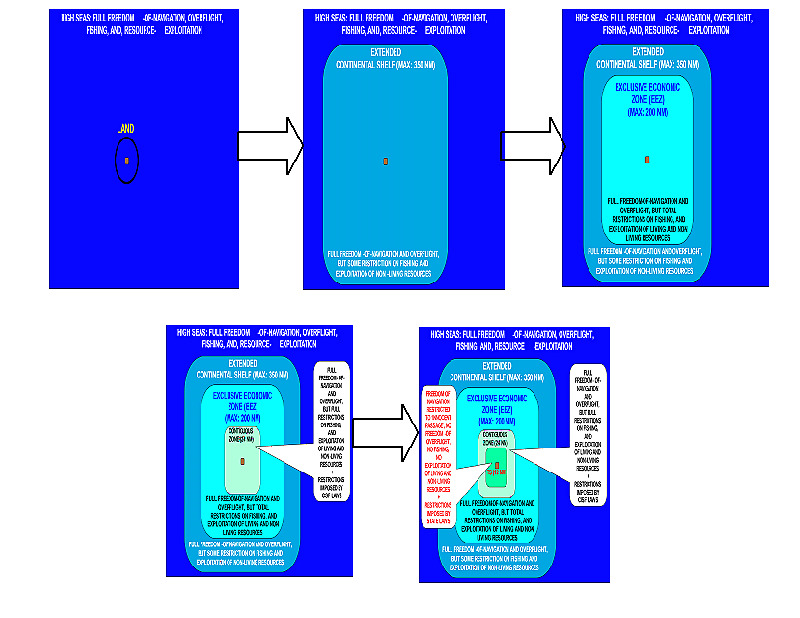
views
The propensity of the US to periodically shoot itself in the foot, completely unexpectedly and completely unnecessarily, is really quite remarkable. Perhaps, at least some of the causes lie in the sheer number of the US interlocutors that are actors on the world stage wherein the law of averages indicates that every now and then, one of them will say or do something exceptionally stupid. The statement of the 7th Fleet commander is the latest manifestation of this.
It is not that the USA’s Freedom of Navigation programme and the activities undertaken within it are new or novel. They certainly predate the present maritime framework, which has been set out under the provisions of the United Nations Convention on the Law of the Sea or the UNCLOS, 1982. Consequently, the shrillness of the debate about whether or not the US has ratified the UNCLOS certainly makes for great TRPs for the electronic media and boosts the circulation of the print media, but has little real relevance.
Amidst all the breast-beating and wailing in the Indian media, generated by the utterly intemperate, unnecessary and downright unintelligent statement of the 7th Fleet that on April 7, 2021, the USS John Paul Jones, an Arleigh Burke Class-guided missile destroyer (DDG) of the US Navy, passed through India’s Exclusive Economic Zone, 130 nautical miles west of the Lakshadweep Islands, on a Freedom of Navigation (FoN) patrol, the following points should be borne in mind:
* The USA’s Freedom of Navigation Programme involves the US Department of State (the US equivalent of our own MEA) and the US Department of Defence (the US equivalent of our own MoD).
* The US Department of State concentrates on that segment of the FoN Programme that involves diplomatic measures, such as lodging protests and rendering advice.
* The US Department of Defence, using the instruments of the US Navy and the US Coast Guard (the latter unlike the case in India is a full-fledged part of the USA’s defence services/armed forces—in fact, it is the oldest of the lot), concentrates on the Freedom of Navigation Operations (FONOPS) and related capability-enhancement activities, such as the provision of legal training in the nuances of public international maritime law, as also operational training such as the conduct of table-top exercises, wargaming and at-sea exercises.
* One of the main reasons why FONOPS are conducted is to prevent “excessive” claims that could place restrictions on the freedoms of navigation and overflight so that they remain unchallenged and acquire the status of customary international law.
* FONOPS have been implemented with regularity at least since 1979, but are generally kept low-key, which is why they have seldom attracted much attention.
* Details of FONOPs undertaken each year are formally presented to the US Congress in an “Annual Freedom of Navigation Report.” These are freely and readily available on the internet, from 1981 to-date. A perusal of these reports will show that FONOPS against India (and also, amongst others, against Bangladesh, Maldives, Pakistan, Sri Lanka, Taiwan, etc.) have been a regular feature, right from 1981, without any of the present brouhaha. Clearly, several of these countries are acknowledged partners.
# Therefore, any emotive conclusion that India has been cast among countries inimical to the US interests may require to be jettisoned.
# For the most part, these FONOPS have challenged the following aspects of what the US considers to be “excessive” claims:
# Prior consent required for military exercises or manoeuvres within the EEZ, in particular those involving the use of weapons or explosives (this is a formal legally well-founded declaration made by India upon ratification of the 1982 UNCLOS, on June 29, 1995).
# India’s requirement for prior notification for foreign warships to enter its territorial sea, including while exercising the right of innocent passage.
# FONOPS are not primarily meant to demonstrate USA’s ‘deterrent-capability’ or ‘resolve’, nor are they designed to reassure allies of the US support.
The 1982 UNCLOS has several residual ambiguities. For instance, the ‘High Seas’ are defined as waters lying seawards of the outer limit of the Exclusive Economic Zone (EEZ). However, ‘high-seas freedoms’—of navigation and overflight, the laying of submarine cables & pipelines, the construction of artificial islands and other permissible installations, the conduct of scientific research, etc.—exist in waters seaward of the ‘Territorial Sea’.
That brings us to the question of what exactly is the EEZ? Is it a unique body of water distinct from the high seas, or, is it simply a body of water within the high seas to which some special regulations apply? What limitations exist in respect of ‘scientific research’ and by which agencies? How is the ‘high seas freedom’ of research to be reconciled with the ‘consent of the coastal state’? These questions have far from straightforward answers and are, in fact, among the most vexed segments of the legacy of the 1982 UNCLOS.
The commonest way of defining the various maritime zones (including the EEZ) created by the 1982 UNCLOS is to proceed outwards from the land. However, if one were to proceed landwards from the high seas, as the following sequential diagrams indicate, perhaps one could arrive at a clearer understanding:

Even after all this, we find ourselves circling back to the question recently posed by a hugely respected former Chief of Navy Staff, Admiral Arun Prakash—“what is the signal the US is sending?”—and his recommendation that the US Navy needs to switch its IFF (Identification ‘Friend’ or ‘Foe’) on. The former is probably addressed by the retort that “there is no cure for stupid”. Stupid is just that. Stupid. The second is entirely agreed with. Perhaps, as a colleague of mine has presciently stated, India, too, needs to keep its IFF on.
Read all the Latest News, Breaking News and Coronavirus News here. Follow us on Facebook, Twitter and Telegram.




















Comments
0 comment